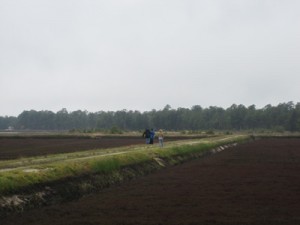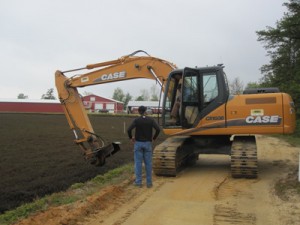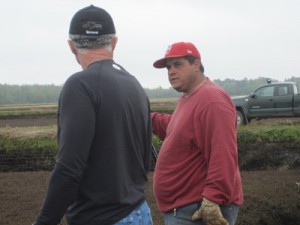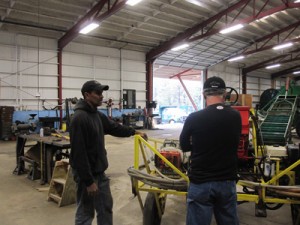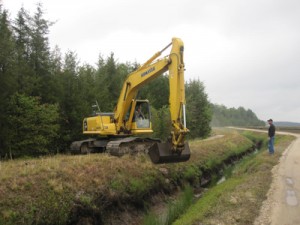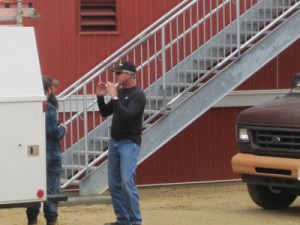This week at Pine Island, I rode along with general manager Fred Torres as he spent his morning making sure our day-to-day operations were running smoothly. A second-generation employee (his father Ernesto was foreman under Bill Sr.), Fred grew up here and has worked on the farm part-time since he was a boy, moving up to full-time in 1971 after his high school graduation. “I started out making boxes [in the blueberry packing house], then I was the shed boy. . .then I started doing all the different jobs here and there. Ditching, that kind of thing. My dad let me run my first small crew when I was 18.” He’s continued to do this, though his scope has considerably expanded; now he’s responsible for the big picture. He oversees all of Pine Island’s operations: sanding, flooding, frost, irrigation. . .he’s worked on it all and has good instincts for doing what has to be done when it’s time to do it.
Our first stop is out at 33 Acre, where Alberto is running a crew removing swan strings. This is a method we’ll talk about in-depth in a future entry, but essentially it’s how we keep swans from destroying the vines without harming them in the process. Fred does what he does all day: talks with Alberto about his crew and their progress, resolves any issues, makes suggestions, and does whatever it takes in order to take care of business.
On the way to our next stop, he talks about frustrations with the weather – it’s keeping the crews from finishing the planting – but he does like getting all the little jobs completed, both for the satisfaction of accomplishment and for the way the smaller jobs fit into the bigger picture. “One thing about a farm,” he says. “You always have to be a step ahead. Two or three steps ahead. You need to have a plan ready.”
Next we visit Holly bog to check on Rick, working on the ditcher. Cleaning out the ditches is how we prepare for summer and makes water management much easier. Fred likes to have it done in case it’s a rainy season; it helps tremendously with irrigation.
After seeing how Rick is doing, we ride to Sawmill to see how the other member of his team is doing cleaning out the pipes. Alejandro is working steadily and carefully.
Fred had some things to chat about with our equipment supervisor, Carlos Baez, so we drove over to the temporary shop to follow up on some ordered parts and to see about some repairs.
Then it was time to check on another long-term employee working on ditching, this time at Blueberry Hill.
We finished our busy morning by going to see the progress at the new shop, where Fred spoke with facilities supervisor Mike Guest about progress and plans.
On the way back to the office, Fred says, “Managing’s a funny thing; nobody necessarily sees you doing it. It’s not like pulling boards, or running sprinklers, or anything like that. But it needs to be done, and if it doesn’t get done right, you definitely know about it.” He tells a story about a reporter who had spent the day covering the harvest; she’d seen him several times as he was making his rounds, and she stopped him to ask: “What is it, exactly, that you do?” Fred grins as he remembers his response:
“I told her I was the guy who keeps the wheels turning.”

